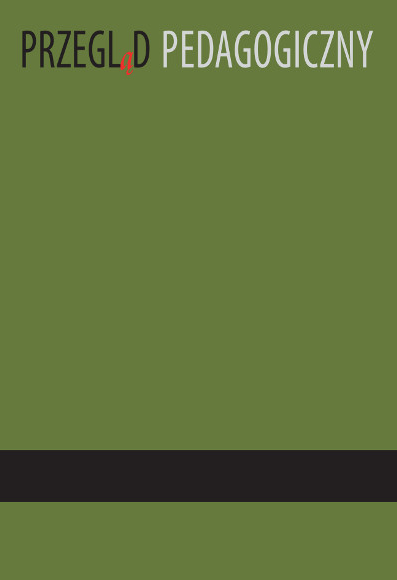Czynny profesjonalizm nauczycieli akademickich
DOI:
https://doi.org/10.34767/PP.2020.02.08Słowa kluczowe:
pedeutologia, aktywne uczenie się, badania jakościowe, nauczyciel akademicki, rozwój profesjonalnyAbstrakt
Aktywny profesjonalizm to pojęcie rozwijane we współczesnej literaturze pedeutologicznej, które jako zadanie nauczyciela określa badanie kontekstu edukacyjnego w miejscy pracy oraz aktywne zaangażowanie we własny rozwój zawodowy. Od nauczycieli oczekuje się prowadzenia badań nad własną praktyką dydaktyczną i dokonywania refleksji nad nią oraz aktywnego kierowania własnym rozwojem. Artykuł przedstawia badania przeprowadzone wśród 14 nauczycieli akademickich specjalizujących się w kształceniu przyszłych nauczycieli języków obcych. W badaniu wykorzystano wywiady niestandaryzowane oraz techniki pomocnicze – mapy myśli i analizę zawartości publikacji naukowych i dydaktycznych. Doboru grupy dokonano metodą kuli śnieżnej. Autorka opisuje wyniki badań, w których odnajduje dwie strategie aktywnego uczenia się przejawiane przez nauczycieli. Są to: strategia naprawcza i strategia poszukiwawcza. Pierwsza z nich przynosi poprawę efektów kształcenia, druga zaś jest przejawem aktywnego samodoskonalenia.
Bibliografia
Bronkhorst L.H., Meijer P.C., Koster B., Vermunt J.D. (2011). Fostering Meaning Oriented Learning and Deliberate Practice in Teacher Education. Teaching and Teacher Education, 27, 1120–1130.
Cochran-Smith M., Lytle S.L. (2009). Inquiry as Stance: Practitioner Research for the Next Generation. New York: Teacher College Press.
Collinson V. (2012). Leading by Learning, Learning by Leading. Professional Development in Education, 38(2), 247–266.
Improving the Quality of Teacher Education. (2007). Commission of the European Communities. Brussels: Communication from the Commission to the Council and the European Parliament.
Cowan J. (2015). Using old reflections as compost. Lifewide Magazine, 13, 23–24.
Czerniawski G. (2013). Professional Development for Professional Learners: Teachers’ Experiences in Norway, Germany and England. Journal of Education for Teaching, 39 (4), 383–399.
Ericsson K.A., Krampe R.T., Tesch-Romer C. (1993). The Role of Deliberate Practice in the Acquisition of Expert Performance. Psychological Review, 100, 363–406.
Ericsson K.A., Staszewski J.J. (1989). Skilled memory and expertise. In: D. Klahr, K. Kotovsky (eds.), Complex information processing. The impact of Herbert A. Simon. Hillsdale: Lawrence Erlbaum Associates.
Forde Ch., McMahon M. (2019). Teacher Quality, Professional Learning and Policy. London: Palgrave Macmillan.
Hargreaves A., Fullan M. (2012). Professional Capital: Transforming Teaching in Every School. London and New York: Routledge.
Hargreaves A., Shirley D. L. (2009). The Fourth Way: The Inspiring Future for Educational Change. Thousand Oaks: Corwin Press.
Huxtable M., Whitehead J. (2017). Enhancing Professionalism in Education through Inquiry Learning: a Living Theory Research Approach. In: P. Boyd, A. Szplit (eds.), Teachers and Teacher Educators Learning Through Inquiry: International Perspective. Krakow: Attyka.
Joyce B.R., Showers B. (1995). Student Achievement Through Staff Development. New York: Longman.
Meister D.G., Ahrens P. (2011). Resisting Plateauing: Four Veteran Teachers’Stories. Teaching and Teacher Education, 27(4), 770–778.
Guceri M. (2014). The Teacher as an Agent of Change in the School Environment. In: P. Boyd, A. Szplit, Z. Zbrog (eds.), Teacher Educators and Teachers as Learners: International Perspectives. Krakow: Libron.
Niemi H., Nevgi A., Aksit F. (2016). Active learning promoting student teachers’professional competences in Finland and Turkey. European Journal of Teacher Education, 39(4), 471–490.
Niemi H., Nevgi A. (2014). Research Studies and Active Learning Promoting Professional Competences in Finnish Teacher Education. Teaching and Teacher Education, 43, 131–142.
Priestley M, Biesta G.J.J., Robinson S. (2012). Teachers as agents of change: An exploration of the concept of teacher agency. Stirling: University of Stirling.
Sachs J. (2003). The Activist Teaching Profession. Buckingham: Open University Press.
Schraw G., Crippen K.J., Hartley K. (2006). Promoting self-regulation in Science Education: Metacognition as Part of a Broader Perspective on Learning. Research in Science Education, 36(1–2), 11–139.
Szplit A. (2019). Od nowicjusza do eksperta. Rozwoj ekspertywności nauczycieli nauczycieli językow obcych (From a novice to an expert. Developing expertise of foreign language teacher educators). Kielce: Wydawnictwo Uniwersytetu Jana Kochanowskiego.
Vermunt J.D., Donche V. (2017). A Learning Patterns Perspective on Student Learning in Higher Education. State of the Art and Moving Forward, Educational Psychology Review, 29 (2), 269–299.
Zeichner K.M., Liston, D.P. (1996). Reflective Teaching. An Introduction. New Jersey: Laurence Associates.
Zimmerman B.J. (2006). Development and Adaptation of Expertise: The Role of Self-regulatory Processes and Beliefs. In: K.A. Ericsson, N. Charness, P.J. Feltovich, R.R. Hoffman (eds.), The Cambridge Handbook of Expertise and Expert Performance. New York: Cambridge University Press.
Zimmerman B.J. (2000). Attaining self-regulation: A social cognitive perspective. In: M. Boekaerts, P.R. Ointrich, M. Zeidner (eds.), Handbook of self-regulation. San Diego, CA: Academic Press.
Zimmerman B.J. (2002). Becoming a self-regulated learner: An overview. Theory into Practice, 41(2), 64–70.
Pobrania
Opublikowane
Numer
Dział
Licencja

Utwór dostępny jest na licencji Creative Commons Uznanie autorstwa – Bez utworów zależnych 4.0 Międzynarodowe.

